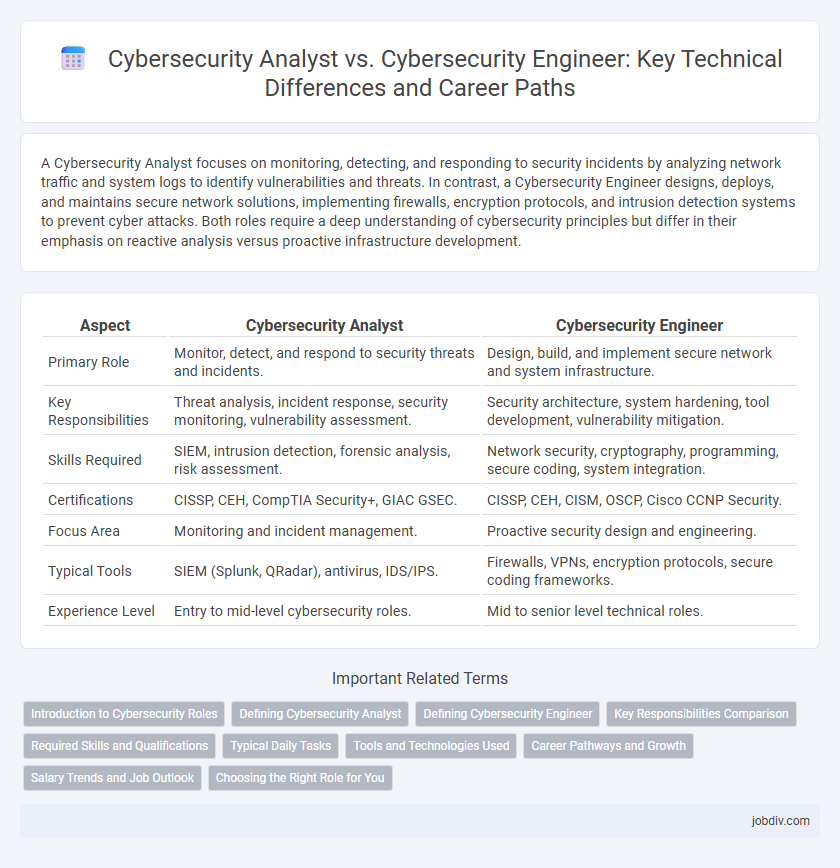A Cybersecurity Analyst focuses on monitoring, detecting, and responding to security incidents by analyzing network traffic and system logs to identify vulnerabilities and threats. In contrast, a Cybersecurity Engineer designs, deploys, and maintains secure network solutions, implementing firewalls, encryption protocols, and intrusion detection systems to prevent cyber attacks. Both roles require a deep understanding of cybersecurity principles but differ in their emphasis on reactive analysis versus proactive infrastructure development.
Table of Comparison
| Aspect | Cybersecurity Analyst | Cybersecurity Engineer |
|---|---|---|
| Primary Role | Monitor, detect, and respond to security threats and incidents. | Design, build, and implement secure network and system infrastructure. |
| Key Responsibilities | Threat analysis, incident response, security monitoring, vulnerability assessment. | Security architecture, system hardening, tool development, vulnerability mitigation. |
| Skills Required | SIEM, intrusion detection, forensic analysis, risk assessment. | Network security, cryptography, programming, secure coding, system integration. |
| Certifications | CISSP, CEH, CompTIA Security+, GIAC GSEC. | CISSP, CEH, CISM, OSCP, Cisco CCNP Security. |
| Focus Area | Monitoring and incident management. | Proactive security design and engineering. |
| Typical Tools | SIEM (Splunk, QRadar), antivirus, IDS/IPS. | Firewalls, VPNs, encryption protocols, secure coding frameworks. |
| Experience Level | Entry to mid-level cybersecurity roles. | Mid to senior level technical roles. |
Introduction to Cybersecurity Roles
Cybersecurity analysts focus on monitoring, detecting, and responding to security breaches by analyzing data from security tools and implementing incident response protocols. Cybersecurity engineers design, build, and maintain secure infrastructure, developing security architectures and integrating advanced technologies to protect networks and systems. Both roles are essential in safeguarding organizational assets, with analysts typically emphasizing threat identification and engineers focusing on preventive system design.
Defining Cybersecurity Analyst
A Cybersecurity Analyst specializes in monitoring and responding to security incidents by analyzing threats, vulnerabilities, and data breaches to protect organizational assets. They utilize tools such as intrusion detection systems (IDS), security information and event management (SIEM) platforms, and perform risk assessments to identify and mitigate potential cyber threats. Emphasis on incident response, threat intelligence analysis, and continuous security monitoring distinguishes their role from that of a Cybersecurity Engineer.
Defining Cybersecurity Engineer
Cybersecurity Engineers design, implement, and maintain secure network solutions to protect an organization's systems from cyber threats. They develop security architecture, conduct vulnerability assessments, and deploy firewalls, intrusion detection systems, and encryption protocols. Their role requires deep technical expertise in network security, software development, and risk mitigation strategies to build resilient defenses.
Key Responsibilities Comparison
Cybersecurity Analysts specialize in monitoring security systems, identifying vulnerabilities, and responding to incidents to protect organizational data. Cybersecurity Engineers design, implement, and maintain security infrastructures, including firewalls, intrusion detection systems, and encryption protocols. Both roles collaborate closely to ensure comprehensive defense strategies, with Analysts focusing on threat analysis and Engineers emphasizing system architecture and proactive security measures.
Required Skills and Qualifications
Cybersecurity Analysts require strong skills in threat detection, vulnerability assessment, and incident response, alongside proficiency in tools like SIEM, IDS/IPS, and endpoint security platforms; a bachelor's degree in cybersecurity, computer science, or related fields is typically necessary. Cybersecurity Engineers demand advanced knowledge in network architecture, secure software development, encryption methods, and automation scripting, with expertise in firewalls, VPNs, and cloud security solutions; a bachelor's or master's degree coupled with certifications such as CISSP, CEH, or OSCP enhances qualifications. Both roles emphasize analytical thinking and up-to-date knowledge of cyber threats, but Engineers focus more on designing and implementing security systems while Analysts concentrate on monitoring and mitigating security incidents.
Typical Daily Tasks
Cybersecurity Analysts primarily monitor network traffic, analyze security breaches, and generate detailed incident reports to identify vulnerabilities and recommend corrective actions. Cybersecurity Engineers design, implement, and maintain secure systems, develop firewalls and encryption protocols, and automate security solutions to prevent cyber threats. Both roles require continuous monitoring and collaboration to ensure robust cybersecurity defenses across enterprise environments.
Tools and Technologies Used
Cybersecurity Analysts primarily utilize SIEM (Security Information and Event Management) tools such as Splunk and IBM QRadar to monitor and analyze security events, along with vulnerability assessment software like Nessus. Cybersecurity Engineers focus on designing and implementing security architectures using firewalls (Palo Alto, Fortinet), endpoint protection platforms, and automation tools such as Ansible and Terraform for secure infrastructure deployment. Both roles rely on scripting languages like Python and employ threat intelligence platforms to effectively manage and respond to cyber threats.
Career Pathways and Growth
Cybersecurity Analysts primarily focus on monitoring, detecting, and responding to security threats, with career growth leading to roles like Senior Analyst or Security Operations Center (SOC) Manager. Cybersecurity Engineers design and implement secure network solutions, with advancement opportunities including positions such as Security Architect or Chief Security Officer (CSO). Both pathways offer robust career growth in cyber risk management, compliance, and advanced threat intelligence skills.
Salary Trends and Job Outlook
Cybersecurity Analysts earn an average salary ranging from $70,000 to $100,000 annually, while Cybersecurity Engineers tend to command higher salaries, typically between $90,000 and $130,000 due to their advanced technical expertise. Job outlook for both roles remains robust, with a projected growth rate of 31% for cybersecurity jobs through 2031, driven by increasing cyber threats and digital transformation. Demand for Cybersecurity Engineers is expected to grow slightly faster as organizations invest heavily in building secure infrastructures.
Choosing the Right Role for You
Cybersecurity Analysts focus on monitoring, detecting, and responding to security threats, requiring strong skills in risk assessment and incident response. Cybersecurity Engineers design, build, and maintain secure systems, demanding deep knowledge of network architecture and security protocols. Selecting the right role depends on your strengths--choose analysis if you excel in problem-solving and real-time threat management, or engineering if you prefer designing robust security frameworks.
Cybersecurity Analyst vs Cybersecurity Engineer Infographic

 jobdiv.com
jobdiv.com